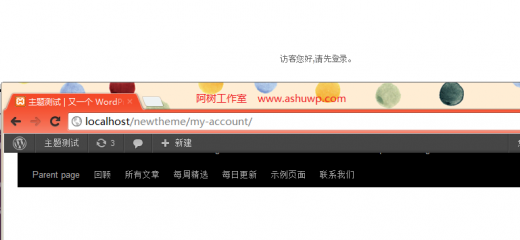前面一篇教程我们介绍了 WordPress url 重写是怎么工作的,这一篇教程我们来个小例子,加深对 WordPress url 重写的认识。
今天的例子要做到的 (这是 WordPress 自定义会员系统的雏形哦):
以默认的 twenty ten 主题为例,我们现在默认主题中新建一个 user 文件夹,文件夹中添加一个 php 文件,里面的代码为:
- <?php
- /*********用户欢迎页面************/
- get_header(); //载入头部文件
- if( !is_user_logged_in()) { //判断用户是否登录
- echo '<div style="text-align:center; margin:40px;"> 访客您好, 请先登录。</div>';
- }else{
- global $current_user;
- get_currentuserinfo();
- $uname = $current_user->user_nicename;
- echo '<div style="text-align:center; margin:40px;"><span style="color:red;">';
- echo $uname; //输出用户名
- echo '</span> 您好,欢迎登陆...</div>';
- }
- get_footer(); //载入底部文件
- ?>
这个文件通过判断用户分别输出一句欢迎语句。效果图 (点击图片查看大图)

实际操作:
一、添加翻译规则。首先我们前面介绍了 url 的翻译规则,我们要往翻译规则中添加一条自己的翻译规则,请往你的 twenty ten 主题的 functions.php 文件添加下列代码:
- add_action('generate_rewrite_rules', 'ashu_rewrite_rules' );
- /**********重写规则************/
- function ashu_rewrite_rules( $wp_rewrite ){
- $new_rules = array(
- 'my-account/?$' => 'index.php?my_custom_page=hello_page',
- ); //添加翻译规则
- $wp_rewrite->rules = $new_rules + $wp_rewrite->rules;
- //php 数组相加
- }
前面我们关于过滤器的教程中提到了过滤器的用法及用处,重写规则位于一个数组中,我们使用过滤器钩子 generate_rewrite_rules 来更改这个规则数组,往里面添加内容,即达到了我们的目的。这个时候,我们访问地址 (作者本机测试地址):localhost/newtheme/my-account/就会被翻译成 index.php?my_custom_page=hello_page 。
翻译规则介绍:
- 'my-account/?$' => 'index.php?my_custom_page=hello_page',
- /*
- 前面应该是一个正则表达式,my-account/?$ 只能匹配 my-account/ 如果你访问的地址是 localhost/newtheme/my-account/aa 则不能匹配
- */
注意到翻译后的地址中有一个 my_custom_page,以及我们上一篇教程中列出来的 author_name,这想当于一个变量。比如我们访问 index.php?author_name=admin,通过这个变量的判断,载入 WordPress 的作者模板,然后根据这个变量的值 admin,显示用户名为 admin 的内容。实际上这些变量存储在一个全局变量 $public_query_vars,这是一个数组,只有数组中存在的变量才能被正确翻译,所以我们要往这个变量中添加元素。
二、添加 $public_query_vars
- /*******添加 query_var 变量***************/
- add_action('query_vars', 'ashu_add_query_vars');
- function ashu_add_query_vars($public_query_vars){
- $public_query_vars[] = 'my_custom_page'; //往数组中添加添加 my_custom_page
- return $public_query_vars;
- }
三、添加模板载入规则。
- //模板载入规则
- add_action("template_redirect", 'ashu_template_redirect');
- function ashu_template_redirect(){
- global $wp;
- global $wp_query, $wp_rewrite;
- //查询 my_custom_page 变量
- $reditect_page = $wp_query->query_vars['my_custom_page'];
- //如果 my_custom_page 等于 hello_page,则载入 user/helloashu.php 页面
- //注意 my-account/被翻译成 index.php?my_custom_page=hello_page 了。
- if ($reditect_page == "hello_page"){
- include(TEMPLATEPATH.'/user/helloashu.php');
- die();
- }
- }
不要高兴的太早,到了这里还没完成呢,现在只添加了代码,但是重写规则还没存储到数据库。
四、更新重写规则
- /***************激活主题更新重写规则***********************/
- add_action( 'load-themes.php', 'frosty_flush_rewrite_rules' );
- function frosty_flush_rewrite_rules() {
- global $pagenow, $wp_rewrite;
- if ( 'themes.php' == $pagenow && isset( $_GET['activated'] ) )
- $wp_rewrite->flush_rules();
- }
OK,到了这里,到后台重新激活你的主题,然后访问地址: 你的 网址 my-account/ 就能看到前面图示的效果了。